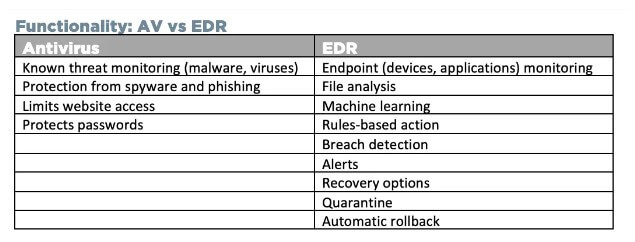EDR Vs Antivirus: Understanding the Key Differences
Let’s break down the disparities between EDR and Antivirus, the two essential components of endpoint security solutions.Basic Vs Advanced Technology
Traditional antivirus software relies on heuristic and signature-based detection methods. However, advanced endpoint security solutions like OpenEDR® incorporate more sophisticated technologies.
While signature-based detection is crucial for known threats, modern endpoint security agents leverage heuristic, detection-based technology, and even incorporate machine learning, behavior analysis, and artificial intelligence tools.
Limited Vs. Extended Protection
Antivirus solutions provide limited protection by scanning files for known threats. In contrast, endpoint protection tools offer comprehensive protection against both known and emerging threats.
Reactive Vs. Proactive Security Approach
Antivirus software operates reactively, responding to threats as they arise. On the other hand, EDR takes a proactive approach by detecting and preventing threats before they cause harm.
With features like forensic analysis and threat intelligence, EDR enables security teams to investigate and mitigate attacks effectively.
File-based Vs. File-less Attacks
As cyber threats evolve, attackers are increasingly using file-less techniques to bypass traditional defenses. While antivirus software is effective against file-based attacks, EDR is better equipped to handle both types of threats.
Does EDR Replace Antivirus?
An advanced EDR with next-generation antivirus capabilities can replace traditional antivirus software. However, it’s advisable to use both solutions for comprehensive protection if your EDR lacks antivirus features.
Choosing the Right Solution
Endpoint protection tools offer superior security compared to antivirus software, providing real-time threat detection and response capabilities. With EDR, your team gains visibility into endpoint activities, enabling proactive threat mitigation.
Considering the evolving threat landscape, investing in advanced endpoint security like OpenEDR® ensures robust protection against cyber threats.
FAQ Section
A: EDR and Antivirus serve different purposes – while Antivirus focuses on known virus prevention, EDR detects and responds to advanced threats in real-time.
A: Yes, Antivirus complements EDR by preventing known malware, while EDR enhances threat detection and response capabilities.
A: EDR is ideal for networks with multiple endpoints that require continuous threat detection, while Antivirus offers protection against known viruses.
A: EDR provides advanced threat monitoring, analysis, behavioral insights, and rapid response actions, making it more effective against evolving threats.



